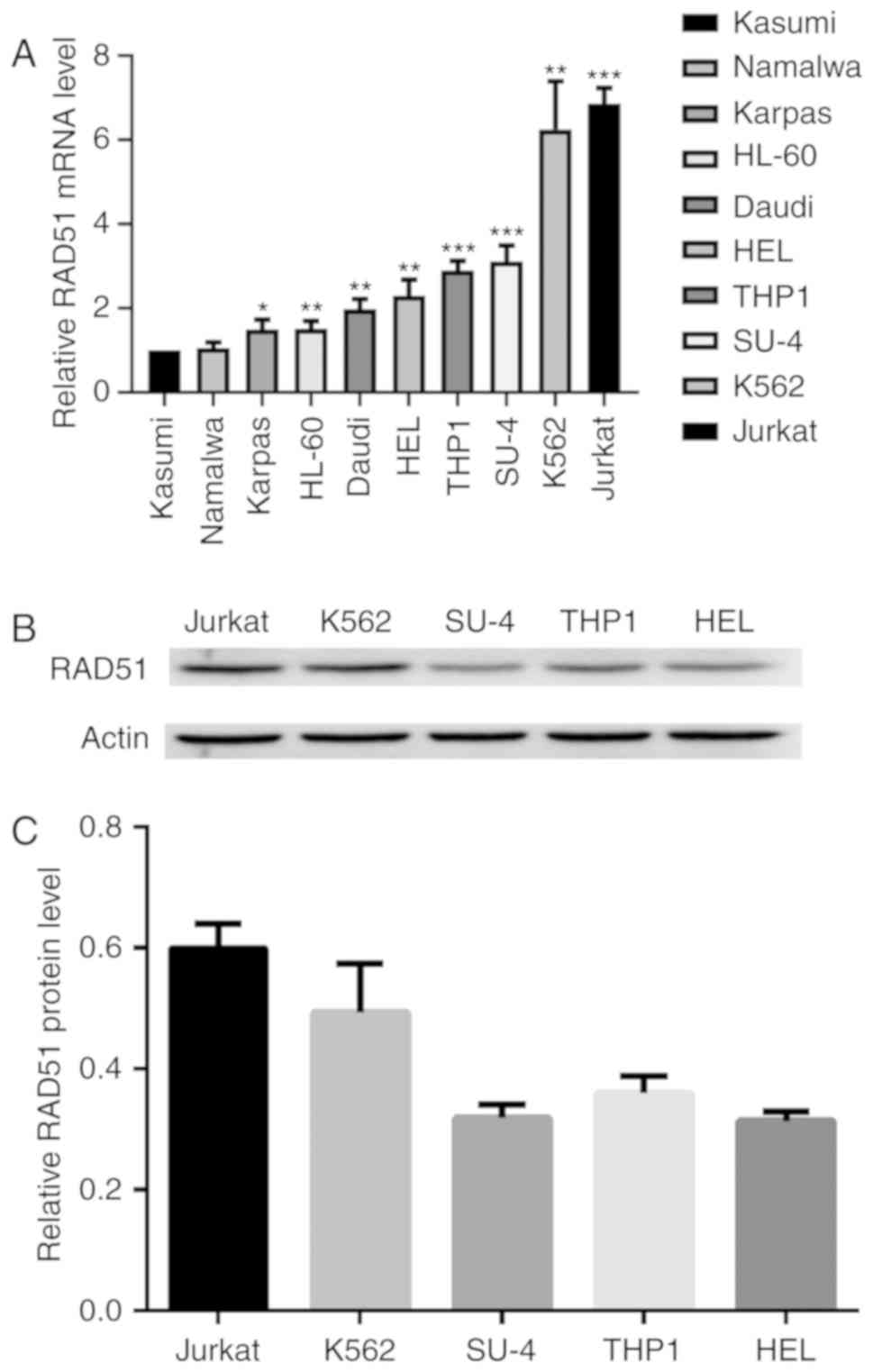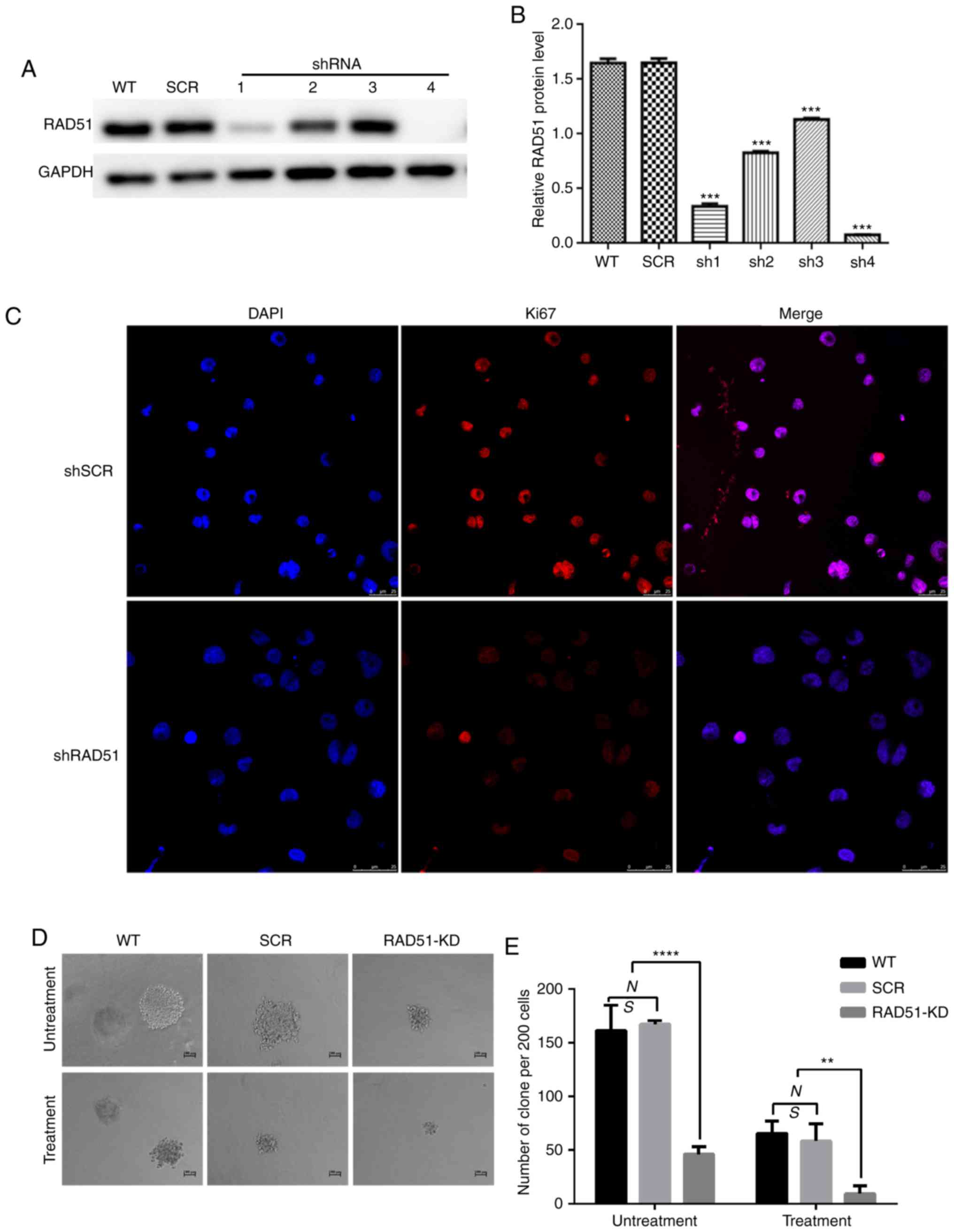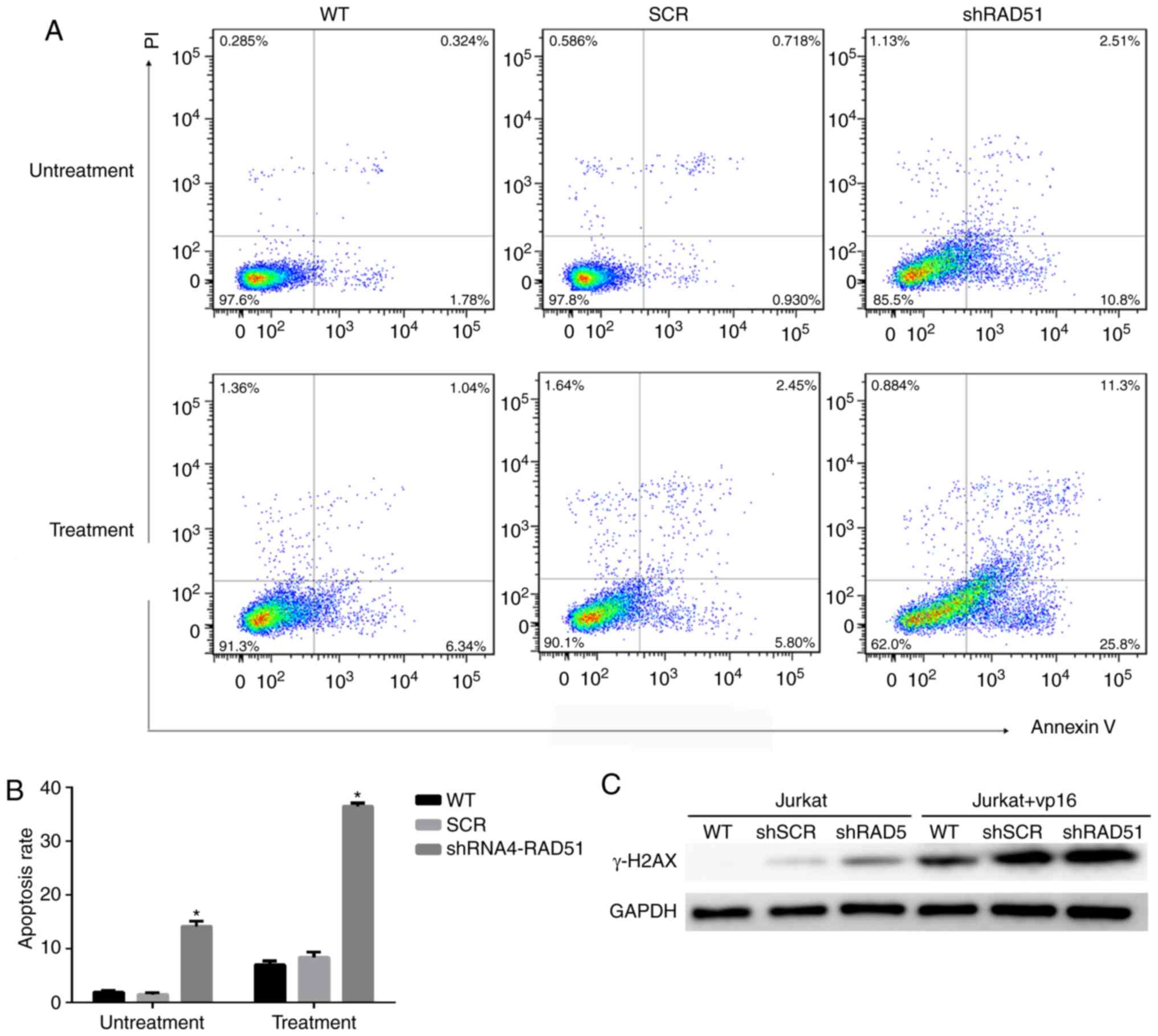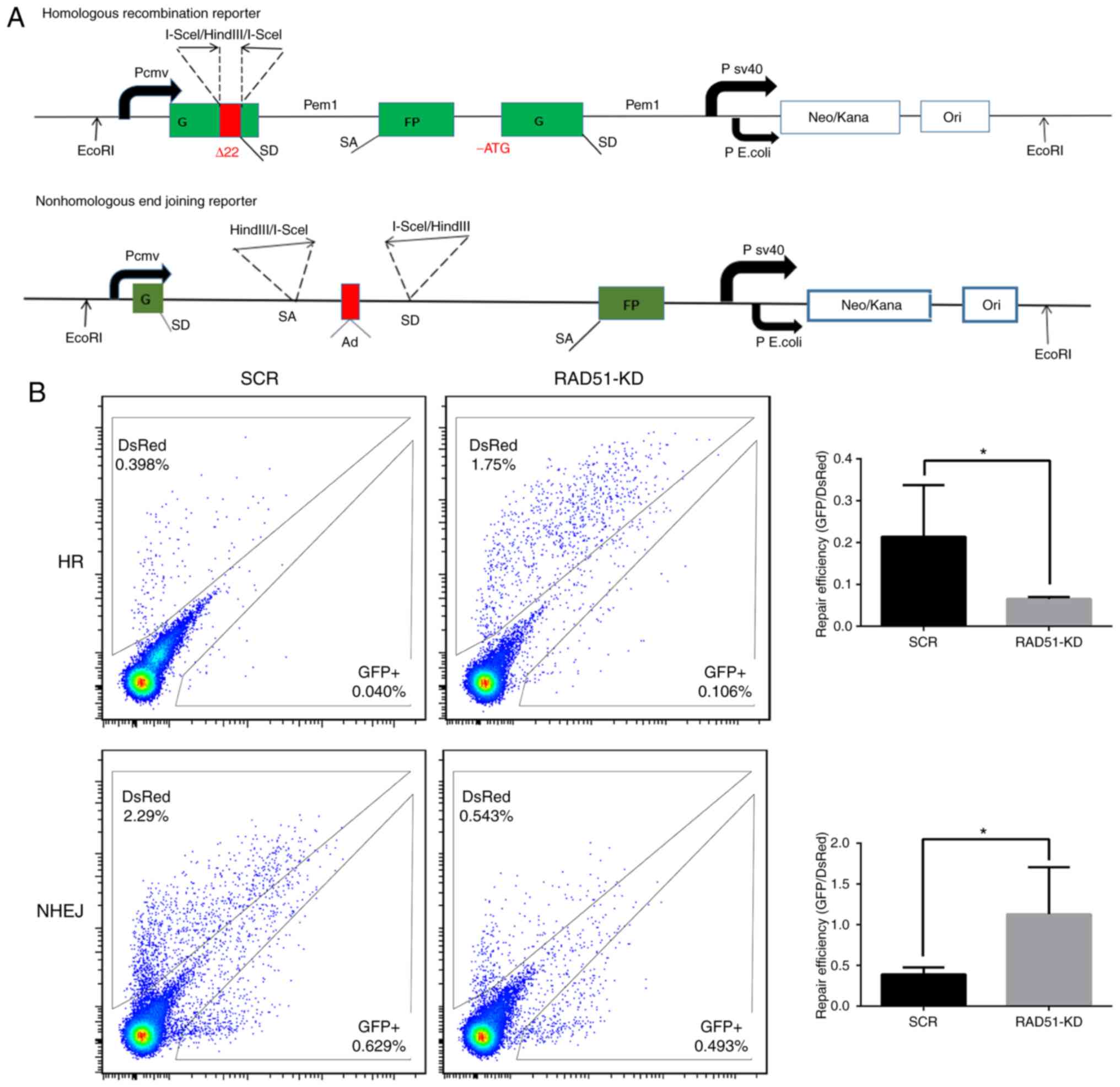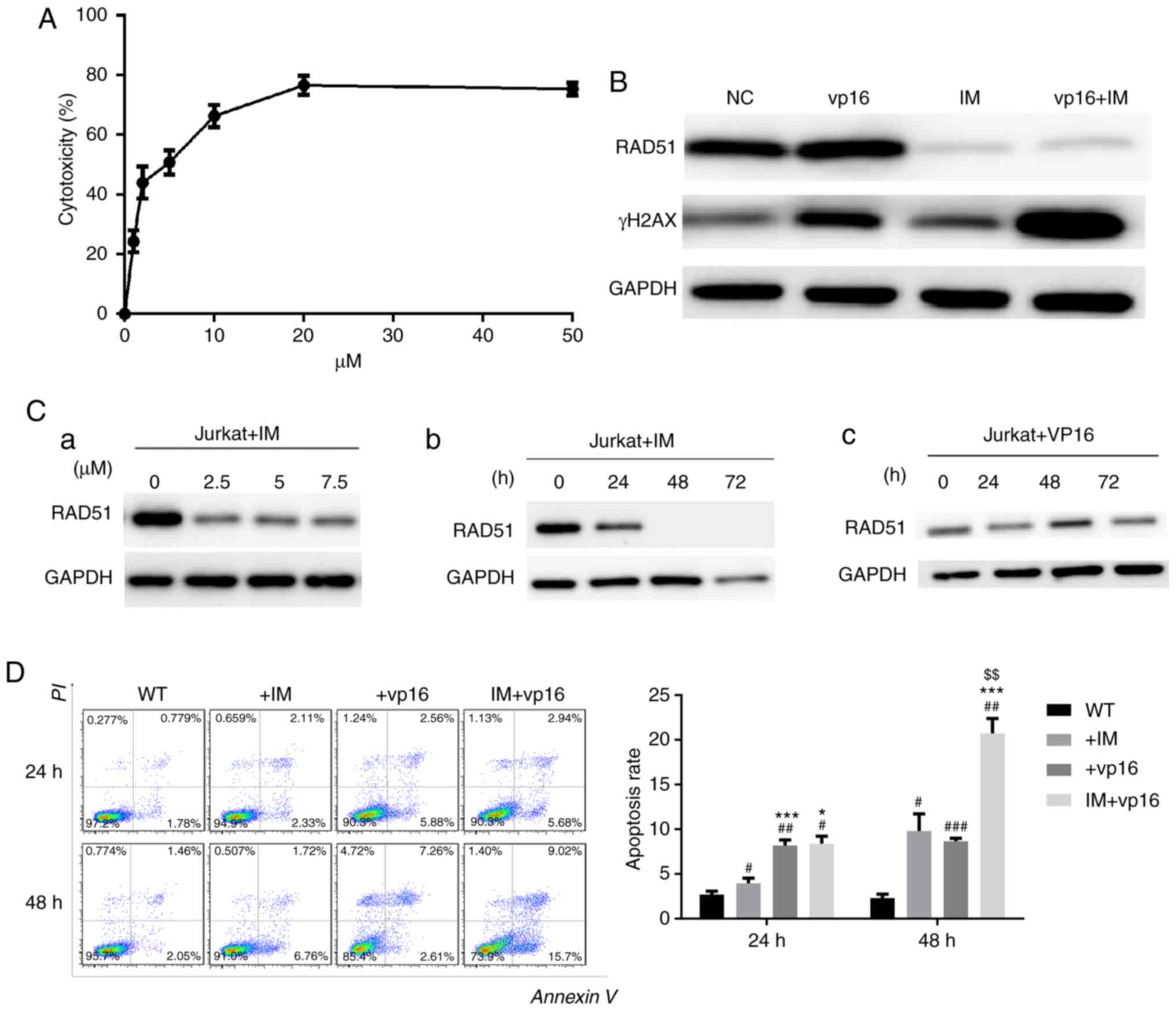|
1
|
Rich T, Allen R and Wyllie AH: Defying
death after DNA damage. Nature. 407:777–783. 2000. View Article : Google Scholar : PubMed/NCBI
|
|
2
|
Khanna KK and Jackson SP: DNA
double-strand breaks: Signaling, repair and the cancer connection.
Nature Genet. 27:247–254. 2001. View
Article : Google Scholar : PubMed/NCBI
|
|
3
|
Linker C, Damon L, Ries C and Navarro W:
Intensified and shortened cyclical chemotherapy for adult acute
lymphoblastic leukemia. J Clin Oncol. 20:2464–2471. 2002.
View Article : Google Scholar : PubMed/NCBI
|
|
4
|
O'Grady S, Finn SP, Cuffe S, Richard DJ,
O'Byrne KJ and Barr MP: The role of DNA repair pathways in
cisplatin resistant lung cancer. Cancer Treat Rev. 40:1161–1170.
2014. View Article : Google Scholar : PubMed/NCBI
|
|
5
|
Hijiya N, Thomson B, Isakoff MS, Silverman
LB, Steinherz PG, Borowitz MJ, Kadota R, Cooper T, Shen V, Dahl G,
et al: Phase 2 trial of clofarabine in combination with etoposide
and cyclophosphamide in pediatric patients with refractory or
relapsed acute lymphoblastic leukemia. Blood. 118:6043–6049. 2011.
View Article : Google Scholar : PubMed/NCBI
|
|
6
|
Hoeijmakers JH: Genome maintenance
mechanisms for preventing cancer. Nature. 411:366–374. 2001.
View Article : Google Scholar : PubMed/NCBI
|
|
7
|
Kanaar R, Hoeijmakers JH and van Gent DC:
Molecular mechanisms of DNA double strand break repair. Trends Cell
Biol. 8:483–489. 1998. View Article : Google Scholar : PubMed/NCBI
|
|
8
|
Arnaudeau C, Helleday T and Jenssen D: The
RAD51 protein supports homologous recombination by an exchange
mechanism in mammalian cells. J Mol Biol. 289:1231–1238. 1999.
View Article : Google Scholar : PubMed/NCBI
|
|
9
|
Ogawa T, Yu X, Shinohara A and Egelman EH:
Similarity of the yeast RAD51 filament to the bacterial RecA
filament. Science. 259:1896–1899. 1993. View Article : Google Scholar : PubMed/NCBI
|
|
10
|
Suwaki N, Klare K and Tarsounas M: RAD51
paralogs: Roles in DNA damage signalling, recombinational repair
and tumorigenesis. Semin Cell Dev Biol. 22:898–905. 2011.
View Article : Google Scholar : PubMed/NCBI
|
|
11
|
Raderschall E, Stout K, Freier S, Suckow
V, Schweiger S and Haaf T: Elevated levels of Rad51 recombination
protein in tumor cells. Cancer Res. 62:219–225. 2002.PubMed/NCBI
|
|
12
|
Wiegmans AP, Al-Ejeh F, Chee N, Yap PY,
Gorski JJ, Da Silva L, Bolderson E, Chenevix-Trench G, Anderson R,
Simpson PT, et al: Rad51 supports triple negative breast cancer
metastasis. Oncotarget. 5:3261–3272. 2014. View Article : Google Scholar : PubMed/NCBI
|
|
13
|
Maacke H, Opitz S, Jost K, Hamdorf W,
Henning W, Krüger S, Feller AC, Lopens A, Diedrich K, Schwinger E
and Stürzbecher HW: Over-expression of wild-type Rad51 correlates
with histological grading of invasive ductal breast cancer. Int J
Cancer. 88:907–913. 2000. View Article : Google Scholar : PubMed/NCBI
|
|
14
|
Short SC, Giampieri S, Worku M,
Alcaide-German M, Sioftanos G, Bourne S, Lio KI, Shaked-Rabi M and
Martindale C: Rad51 inhibition is an effective means of targeting
DNA repair in glioma models and CD133+ tumor-derived
cells. Neuro Oncol. 13:487–499. 2011. View Article : Google Scholar : PubMed/NCBI
|
|
15
|
Barbano R, Copetti M, Perrone G, Pazienza
V, Muscarella LA, Balsamo T, Storlazzi CT, Ripoli M, Rinaldi M,
Valori VM, et al: High RAD51 mRNA expression characterize estrogen
receptor-positive/progesteron receptor-negative breast cancer and
is associated with patient's outcome. Int J Cancer. 129:536–545.
2011. View Article : Google Scholar : PubMed/NCBI
|
|
16
|
Richardson C: RAD51, genomic stability,
and tumorigenesis. Cancer Lett. 218:127–139. 2005. View Article : Google Scholar : PubMed/NCBI
|
|
17
|
Kubler HR, van Randenborgh H, Treiber U,
Wutzler S, Battistel C, Lehmer A, Lehmer A, Wagenpfeil S, Hartung R
and Paul R: In vitro cytotoxic effects of imatinib in combination
with anticancer drugs in human prostate cancer cell lines.
Prostate. 63:385–394. 2005. View Article : Google Scholar : PubMed/NCBI
|
|
18
|
Ishida T, Takizawa Y, Kainuma T, Inoue J,
Mikawa T, Shibata T, Suzuki H, Tashiro S and Kurumizaka H: DIDS, a
chemical compound that inhibits RAD51-mediated homologous pairing
and strand exchange. Nucleic Acids Res. 37:3367–3376. 2009.
View Article : Google Scholar : PubMed/NCBI
|
|
19
|
Farmer H, McCabe N, Lord CJ, Tutt AN,
Johnson DA, Richardson TB, Santarosa M, Dillon KJ, Hickson I,
Knights C, et al: Targeting the DNA repair defect in BRCA mutant
cells as a therapeutic strategy. Nature. 434:917–921. 2005.
View Article : Google Scholar : PubMed/NCBI
|
|
20
|
Takaku M, Kainuma T, Ishida-Takaku T,
Ishigami S, Suzuki H, Tashiro S, van Soest RW, Nakao Y and
Kurumizaka H: Halenaquinone, a chemical compound that specifically
inhibits the secondary DNA binding of RAD51. Genes Cell.
16:427–436. 2011. View Article : Google Scholar
|
|
21
|
Huang F, Motlekar NA, Burgwin CM, Napper
AD, Diamond SL and Mazin AV: Identification of specific inhibitors
of human RAD51 recombinase using high-throughput screening. ACS
Chem Biol. 6:628–635. 2011. View Article : Google Scholar : PubMed/NCBI
|
|
22
|
Budke B, Kalin JH, Pawlowski M,
Zelivianskaia AS, Wu M, Kozikowski AP and Connell PP: An optimized
RAD51 inhibitor that disrupts homologous recombination without
requiring Michael acceptor reactivity. J Med Chem. 56:254–263.
2013. View Article : Google Scholar : PubMed/NCBI
|
|
23
|
Zhu J, Zhou L, Wu G, Konig H, Lin X, Li G,
Qiu XL, Chen CF, Hu CM, Goldblatt E, et al: A novel small molecule
RAD51 inactivator overcomes imatinib-resistance in chronic myeloid
leukaemia. EMBO Mol Med. 5:353–365. 2013. View Article : Google Scholar : PubMed/NCBI
|
|
24
|
Choudhury A, Zhao H, Jalali F, Al Rashid
S, Ran J, Supiot S, Kiltie AE and Bristow RG: Targeting homologous
recombination using imatinib results in enhanced tumor cell
chemosensitivity and radiosensitivity. Mol Cancer Ther. 8:203–213.
2009. View Article : Google Scholar : PubMed/NCBI
|
|
25
|
Kachhap SK, Rosmus N, Collis SJ,
Kortenhorst MS, Wissing MD, Hedayati M, Shabbeer S, Mendonca J,
Deangelis J, Marchionni L, et al: Downregulation of homologous
recombination DNA repair genes by HDAC inhibition in prostate
cancer is mediated through the E2F1 transcription factor. PLoS One.
5:e112082010. View Article : Google Scholar : PubMed/NCBI
|
|
26
|
Du LQ, Du XQ, Bai JQ, Wang Y, Yang QS,
Wang XC, Zhao P, Wang H, Liu Q and Fan FY: Methotrexate-mediated
inhibition of RAD51 expression and homologous recombination in
cancer cells. J Cancer Res Clin Oncol. 138:811–818. 2012.
View Article : Google Scholar : PubMed/NCBI
|
|
27
|
Scully R, Chen J, Plug A, Xiao Y, Weaver
D, Feunteun J, Ashley T and Livingston DM: Association of BRCA1
with Rad51 in mitotic and meiotic cells. Cell. 88:265–275. 1997.
View Article : Google Scholar : PubMed/NCBI
|
|
28
|
Sharan SK, Morimatsu M, Albrecht U, Lim
DS, Regel E, Dinh C, Sands A, Eichele G, Hasty P and Bradley A:
Embryonic lethality and radiation hypersensitivity mediated by
Rad51 in mice lacking Brca2. Nature. 386:804–810. 1997. View Article : Google Scholar : PubMed/NCBI
|
|
29
|
Livak KJ and Schmittgen TD: Analysis of
relative gene expression data using real-time quantitative PCR and
the 2(-Delta Delta C(T)) method. Methods. 25:402–408. 2001.
View Article : Google Scholar : PubMed/NCBI
|
|
30
|
Seluanov A, Mao Z and Gorbunova V:
Analysis of DNA double-strand break (DSB) repair in mammalian
cells. J Vis Exp. 8:20022010.
|
|
31
|
Scholzen T and Gerdes J: The Ki-67
protein: From the known and the unknown. J Cell Physiol.
182:311–322. 2000. View Article : Google Scholar : PubMed/NCBI
|
|
32
|
Rogakou EP, Pilch DR, Orr AH, Ivanova VS
and Bonner WM: DNA double-stranded breaks induce histone H2AX
phosphorylation on serine 139. J Biol Chem. 273:5858–5868. 1998.
View Article : Google Scholar : PubMed/NCBI
|
|
33
|
Maacke H, Jost K, Opitz S, Miska S, Yuan
Y, Hasselbach L, Lüttges J, Kalthoff H and Stürzbecher HW: DNA
repair and recombination factor Rad51 is over-expressed in human
pancreatic adenocarcinoma. Oncogene. 19:2791–2795. 2000. View Article : Google Scholar : PubMed/NCBI
|
|
34
|
Henning W and Stürzbecher HW: Homologous
recombination and cell cycle checkpoints: Rad51 in tumour
progression and therapy resistance. Toxicology. 193:91–109. 2003.
View Article : Google Scholar : PubMed/NCBI
|
|
35
|
Chen G, Yuan SS, Liu W, Xu Y, Trujillo K,
Song B, Cong F, Goff SP, Wu Y, Arlinghaus R, et al:
Radiation-induced assembly of Rad51 and Rad52 recombination complex
requires ATM and c-Abl. J Biol Chem. 274:12748–12752. 1999.
View Article : Google Scholar : PubMed/NCBI
|
|
36
|
Stürzbecher HW, Donzelmann B, Henning W,
Knippschild U and Buchhop S: P53 is linked directly to homologous
recombination processes via RAD51/RecA protein interaction. EMBO J.
15:1992–2002. 1996. View Article : Google Scholar : PubMed/NCBI
|
|
37
|
Yuan ZM, Huang Y, Ishiko T, Nakada S,
Utsugisawa T, Kharbanda S, Wang R, Sung P, Shinohara A,
Weichselbaum R and Kufe D: Regulation of Rad51 function by c-Abl in
response to DNA damage. J Biol Chem. 273:3799–3802. 1998.
View Article : Google Scholar : PubMed/NCBI
|
|
38
|
Saitoh H, Pizzi MD and Wang J:
Perturbation of SUMOlation enzyme Ubc9 by distinct domain within
nucleoporin RanBP2/Nup358. J Biol Chem. 277:4755–4763. 2002.
View Article : Google Scholar : PubMed/NCBI
|
|
39
|
Nitiss JL: Targeting DNA topoisomerase II
in cancer chemotherapy. Nat Rev Cancer. 9:338–350. 2009. View Article : Google Scholar : PubMed/NCBI
|
|
40
|
Wu CC, Li TK, Farh L, Lin LY, Lin TS, Yu
YJ, Yen TJ, Chiang CW and Chan NL: Structural basis of type II
topoisomerase inhibition by the anticancer drug etoposide. Science.
333:459–462. 2011. View Article : Google Scholar : PubMed/NCBI
|
|
41
|
Muslimovic A, Nystrom S, Gao Y and
Hammarsten O: Numerical analysis of etoposide induced DNA breaks.
PLoS One. 4:e58592009. View Article : Google Scholar : PubMed/NCBI
|
|
42
|
Li Z, Sun B, Clewell RA, Adeleye Y,
Andersen ME and Zhang Q: Dose-response modeling of
etoposide-induced DNA damage response. Toxicol Sci. 137:371–384.
2014. View Article : Google Scholar : PubMed/NCBI
|
|
43
|
Li Y, He Y and Luo Y: Crystal structure of
an archaeal Rad51 homologue in complex with a metatungstate
inhibitor. Biochemistry. 48:6805–6810. 2009. View Article : Google Scholar : PubMed/NCBI
|















